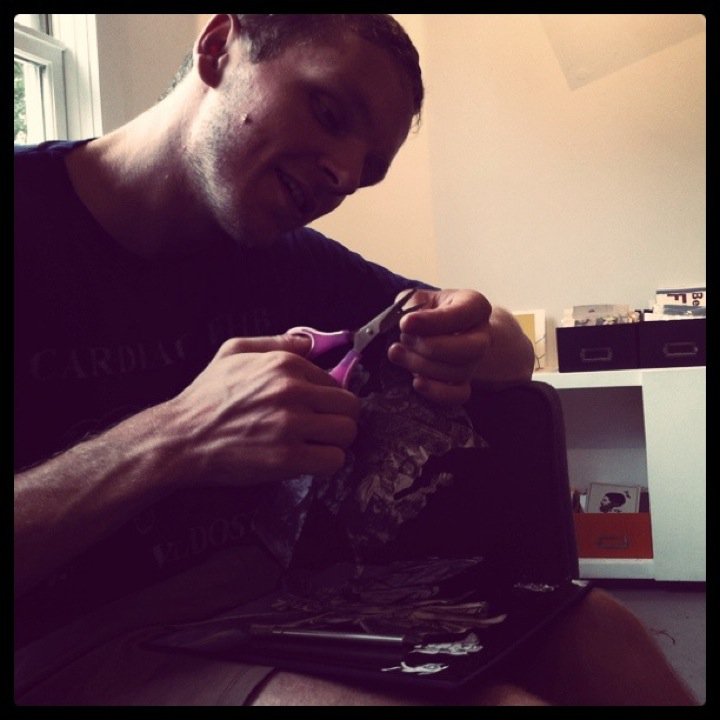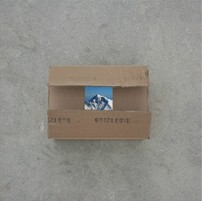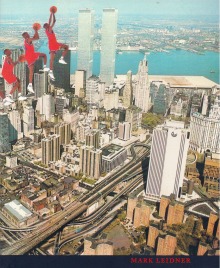Author Spotlight
A Giant Triangle of Anxiety: An Interview with Mark Leidner

2011 has been a big year for Mark Leidner. Besides being one of the best things going on twitter, he’s also released two books: The Angel in the Dream of Our Hangover, a book of aphorisms from Sator Press; and Beauty Was The Case That They Gave Me, a book of poems from Factory Hollow Press. Each are singular in that they somehow manage to be both hilarious and uncannily gorgeous in their method of exploration, seeming to hyper-compress big ideas into forms that in lesser hands would seem absurd. Over the past couple weeks, Mark and I exchanged some emails about his books, sincerity, humor, religion, logic, and terror, among other things.
* * *
Butler: The Angel in the Dream of Our Hangover reads mostly like a book of aphorisms, which is an interesting format to take up. I think a lot of it reads as very sincere, even when it is using strange spins on the traditional aphorism, such as fatherfucker, or what some would consider “ridiculous imagery” such as punching water. I wonder if you knew you were writing a book of aphorisms, if you see it that way, and how this began to come together and form a book?
Leidner: I was trying to write aphorisms on purpose. The book didn’t begin that way though. Initial drafts contained more ironic or jokier stuff – the kind of thing that in the heat of the moment on Twitter can be exciting – which is how Ken Baumann the publisher first approached me – proposing a book that would begin as a carefully selected arrangement of tweets – but as the book grew, we felt the center start to cohere around the aphorism. A line like “what if hot dogs were the cut off horns of meat unicorns” can be interesting on Twitter because in Twitter it will burst into your feed like a surprise, it’ll be free, and there won’t by any high-minded literary expectation waiting for it in you. But copied & pasted into the literary form of the book and it becomes much more boring (at least to me) especially if it’s a book I’ve paid for, because while briefly interesting, its central juxtaposition doesn’t target anything I more than superficially care about. Great tweets give you a huge reward up front at the expense of lasting power. But a good aphorism rewards you more the more you think about it, partly because it is attached to some enduring concern. But that’s their downfall. Generalizing about grand themes is didactic – so the challenge of writing them in a way that honored complexity was very exciting, and pushed me into ridiculous imagery that felt both personal and universal.
Butler: So would you say that this book wholly earnest, then? Or is there an ambiguity there?

The Angel in the Dream of Our Hangover
Leidner: I tried to be as earnest as possible, which to me doesn’t preclude ambiguity, and maybe even is necessary for the most ambiguous ambiguities. It’s hard to answer this question because earnestness in one echelon of form can easily lead to irony in another. Like how if you really want to win a war, you might decide to be deceptive in a battle. You might even fake losing a battle in order to later enact a more stunning reversal. Is that strategy a corruption of your earnestness? Or the proof that your desire to win is in the highest earnest. Good opposites always touch each other and I think the point at which they do is where it starts.
Butler: I wonder how it felt writing these pieces as a matter of function, in light of that, like were they things that occurred to you and then you manipulated, like a tweet, or how did that period of composition work?
Leidner: Forcing them at first led to a bunch of bad writing, but it helped me sink the formal properties into my subconscious. So the next time I had an organic thought about X–it bubbled up out of the void in a form closer to the one I was trying to learn. In that way the book came about sort of like breathing–I’d overhear someone use the verb ‘carom’ or something… and the little sweatshop in my head would get to work thinking, okay, that’s a strange-yet-familiar verb… what could carom?… death caroms… life caroms… time caroms… okay… off what… time caroms off life… off death… poetry caroms off death… no… more sound… character caroms off time…. okay a context… when does it do this… in death our character caroms off… grief… wait… what does that even mean… I can’t see it… start over… more visceral… laughter caroms off… laughter cannons off… laughter is a cannon fired by…” and so on. Often I would get to something that look and sounded right but wasn’t actually true. Or was true and wasn’t interesting. Basically cycling through until I gave up or found something that pleased all the gods. Sometimes it would be that clinical. Other times it would just come out. I would be writing something else or talking about a movie and an aphorism would erupt like a turd or Minerva in perfect form. So by breathing I mean a back and forth between being a scientist about it and being a poet about it.
Butler: That is a fascinating progression there, in the thinking. Is this kind of trailing or recursive exploration a method you use in other writing, such as the poems in your other new book, Beauty Was The Case That They Gave Me? In there, the two largest sections are these poems that operate as a kind of list or riffing on an idea, which felt similar in their logical exploration of a ridiculous premise, i.e. explanations of set ups for romantic comedies. I also wonder how putting that put together felt different logically than the first.
 Leidner: Recursive is a good word. When writing these riff poems I would go on hourlong runs and try to come up with new lines. I’d remember ten per run because that’s how many fingers I had, and could only remember them if I associated each line with a finger.
Leidner: Recursive is a good word. When writing these riff poems I would go on hourlong runs and try to come up with new lines. I’d remember ten per run because that’s how many fingers I had, and could only remember them if I associated each line with a finger.
Other lines were generated collaboratively in gchat. Others were thought of at the computer, or while driving, or reading. But the basic process was to let the form take over my existence for a few months and write down whatever trash that wind whipped through my mind.
Phase two was culling weak lines while editing the survivors. This would restart the riff, so new lines would flower up late in the process. Time and again the most clever and beautiful things I would think of would come after 99% of the poem was complete, so then I’d spend weeks trying to figure out how to insert those best lines, how to wrap the current form of the poem around them in a way that felt natural. But mostly that failed. Whatever burst of heat the new lines brought to the piece was lost to a disruption in the emotional or psychological arc the weaker lines had successfully established.
This was less a problem with the aphorisms. The Angel in the Dream of Our Hangover privileges meaningful moments over meaningful narrative.
Butler: That culling and insertion process seems really important, as it leads to another major feature of both books, which is their sense of humor. But unlike the way a lot of writing goes for laughs by seeming “random” or introducing non sequiturs, I think what causes a want of laughter in the reader is the enormous leaps of logic that occur in the thinking, and the way you are able to work those logics out from seemingly “almost retarded” beginning stations, such as spitting in the bathtub while on the toilet, into these systems of thinking that do more work in how they get to where they are going than how they technically surprise. Does that make sense? Is humor important to you as a vehicle in writing, or is it a byproduct?
Leidner: Sometimes it’s simpler and I just want to be funny because I love things that are funny. Sometimes it’s loftier, like what is most true? I try to say something true and I end up with a paradox that existentially punishing and therefore hilarious… once I get over it. So there humor is a byproduct of the search for truth.
I tend to find more meaning in narrative and monologue, in broader emotional or psychological arcs, than in individual words, or the ephemeral joke-arc of a non sequitur. I think humor depends on depth of tension. There is just so little tension in randomness. Or in a pattern that is only available to the speaker. The first random thing that happens — pig-ponies! — can be funny for a second. But the next time it happens, it’s less funny because you’re ready for it. The listener has less anxiety about the end of the poem because the listener knows anything can happen. But if the joke is stripped of all non sequitur and pushed, relentlessly, along a path of logic which is blatantly available to both listener and speaker, both can have anxiety about where it will end up, and what it will ultimately mean. Maximizing this anxiety and then, at the last second, shattering it, is a key trope of humor. Part of keeping on that path is not breaking. It’s like how if someone told you that The Matrix was the best movie in the world, and then winked, that’s lame comedy. That to me parallels the flat effect of jokey poetry. But if they told you The Matrix was the best movie in the world and just stared into your eyes without blinking… until you blinked, that’s a tragedy so unbearable you have to laugh. You have to say that’s absurd. But this buffoon thinks it’s real? That’s impossible. Because that buffoon is a human like me. The irreconcilability of that wedges into us and leaves a giant triangle of anxiety. We survive by laughing. Otherwise we would simply kill that person. It feels good to laugh. Laughter is the orgasm of fear.
I sometimes think of this Marilyn Monroe quote. “If you can make a girl laugh, you can make her do anything.” If the goal of a poet is to take the language, or the reader, or the self, to someplace they have never been before, to a place where the last two words of her quote — “do anything” — can happen, humor can crowbar open the audience to ‘an anything’ they are resistant to imagine. If you can make people laugh, you have their attention. Those eyes and ears are beams of light. You hold mirrors. You can point them at anything. It can be at another joke. Or an unforgettable glimpse of hell. Or a gesture of universal love for all humanity. Or lyric.
Butler: I like that idea a lot, products of anxiety from humor. It makes me think about absolutes. Like, most anxiety in a person is particular to their sensibilities, and even the grander things we might be afraid of (death) seem like they are handled differently by each person, which makes the machine of humor playing off those things also different. Though it seems here that in a lot of your writing their seems a fundamental element, almost moral sometimes and often playing on these fields of belief that the use of humor allows you to distance yourself from, but also in the end end up being closer to. It’s almost religious without definitive religion. I wonder if you were influenced at all by religion, or a kind of moral experience, or other moral thinkers?
Leidner: I grew up Catolico in the deep south. Growing up I had this feeling of religious belonging (in the sense I was a Christian surrounded by 100% Christians) but also a cool alienation (in the sense my peers were Protestant), like there was something magical, European, and ancient about my beliefs whereas my friends’ were drab and colorless. Something about acoustic guitars and praise songs seemed pathetic compared to drinking blood to organ music and medieval choruses out of golden Eucharistic gear. My dad was also really paranoid about us turning Protestant, so there was a degree of perceived exceptionalism woven into my moral fiber, even though now it seems ridiculous to imagine someone thinking they’re special because they’re swimming Catholic in a Baptist sea. I think this religious feeling though, a search for something as universal and reliable as God, and what it means to be a good person, sometimes in contrast to what it means to be literarily excellent, is at the center of my writing. A sense of religious desire, even if it is undefined and tattered by the winds of agnosticism, if you can believe in it, allows you to attain distance from almost any other. From that distance you can view familiar subject matter with a curvy or stupid or foolish point of view. There’s such a thing as a good fool. But it requires some kind of spiritual anchor, otherwise you get lost in the funhouse. All my favorite writers seem to cut their literary anguish with moral anguish. John Donne’s arc from lascivious courtesan to self-immolating apostle has always felt powerful to me. I like Nietzsche, but I love Christ. Emerson, Whitman, and Dickinson are the best. There’s something about a new nation that requires people to say new things that are never said better again. My imagination is like a dump truck full of internet stuck in the mud of Romanticism. A swirl of angels & demons & heroes & villains is a way to see things that gives me the most pleasure. I know that’s not how reality is. But it makes conflict and meaning more vivid when the point of view is a ballet of epic contrasts. The ironic reversals are extreme and a sense of surprise and splendor is magnified. Even if a true vision of reality is sacrificed. You get more vivid visions of elemental emotions.
Butler: What terrifies you?
Leidner: The kid in me wants the world to be a game that by doing the right thing you can win. But it’s not. It’s open and endless and ruleless and then it’s over. Accepting that terrifies me. Because it’s the end of youth. The idea of spending the next 5 years writing something I value more than the people around me terrifies me. The idea that that’s what I did with the last 5 years terrified me for a while this Spring, but I think I’m on the other side of that terror now, and hope to choose life over art from now on. I’m also sometimes terrified of an asteroid hitting the planet. Also, every time I get a stomach ache or a weird itch on my leg, I immediately panic to all my close friends, “Is it cancer?!?!” and am terrified for a week like an idiot. Most terror I have ever experienced is later revealed to have been completely unnecessary.
* * *
Mark Leidner’s books are available now from Sator Press and Factory Hollow Press.
Tags: Beauty was the case that they gave me, mark leidner, the angel in the dream of our hangover

Mark Leidner you are the best thing ever.
Congrats, Mark. This is a fascinating interview.
Mark Leidner is amazing and I loved reading this interview.
I like Jesus, and I love Nietzsche.
geez, i thought my bookshelf was all caught up on leidner, but somehow i missed the Angel book (ordering now!). good interview. and marilyn/mark know what’s up!
recently, dunno why it took so long, tapped into mark leidner’s twitter which i feel is genius
mark leidner seems like a good friend to have
I think Mark Leidner might be the most intelligent person I’ve ever interacted with.
“Laughter is the orgasm of fear.” is so yessss
Good opposites always touch each other and I think the point at which they do is where it starts.
KABOOM
Thanks guys, for this interview. I liked the background Mark gave into the writing process. I had wondered if it might have started from a short poems and internet poems and then became a little mammoth collection of “aphorisms.” Sator Press on the war path….
I was like, that lede has to be the dumbest thing I’ve ever seen. And then I read the second line.
http://www.jerseymall.org ( copy or click link your web there )
NFL JERSEY 21USD,MLB 22USD,NHL 38USD,CAPS 12USD!
[…] like to have an influence. We survive by laughing. Ferdinand Cheval and Louis of Bavaria built the castles that they wanted to build, in accordance […]
[…] He has a new book of aphorisms. […]
[…] You can order the book here, and read a good interview with Leidner here. […]